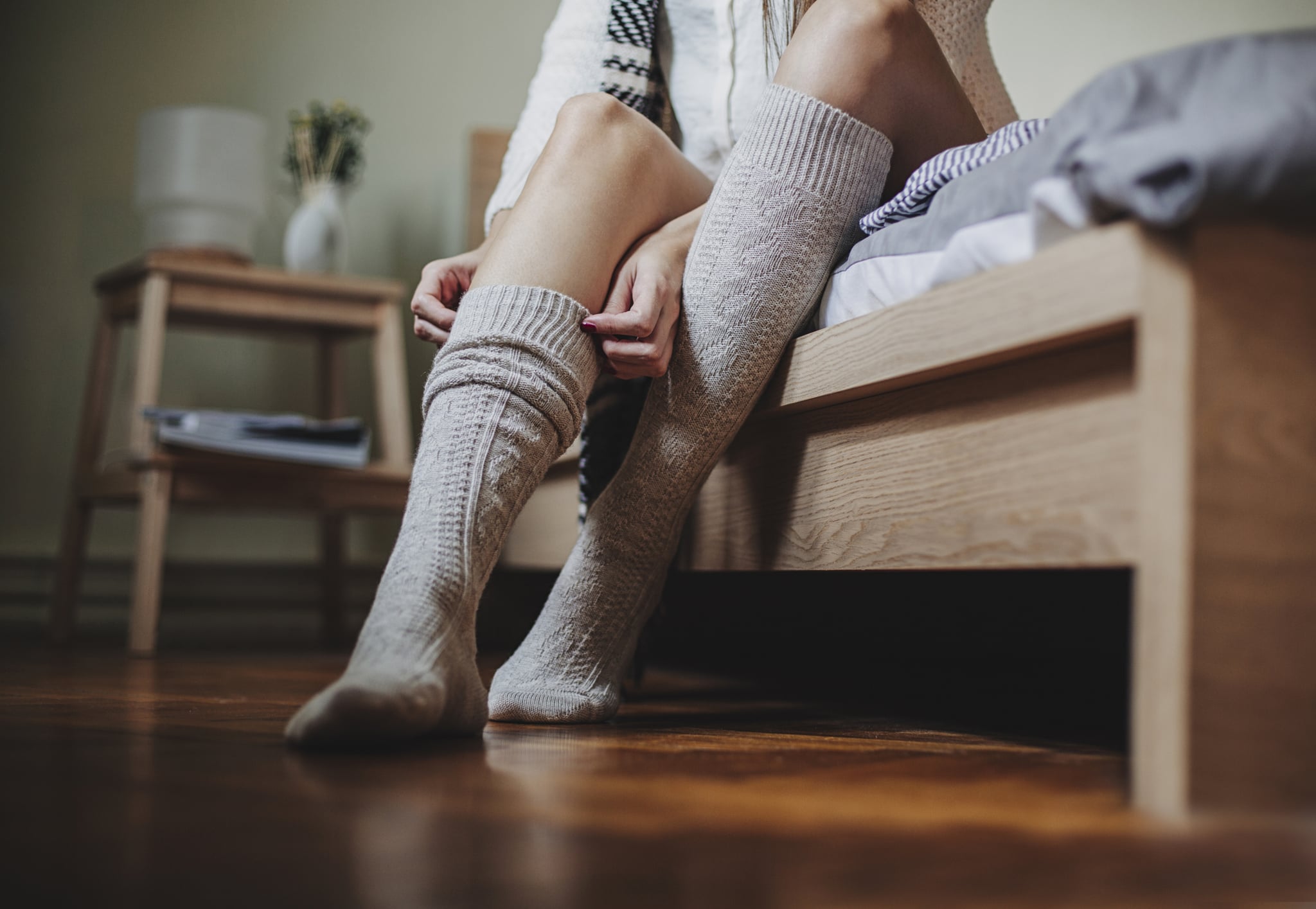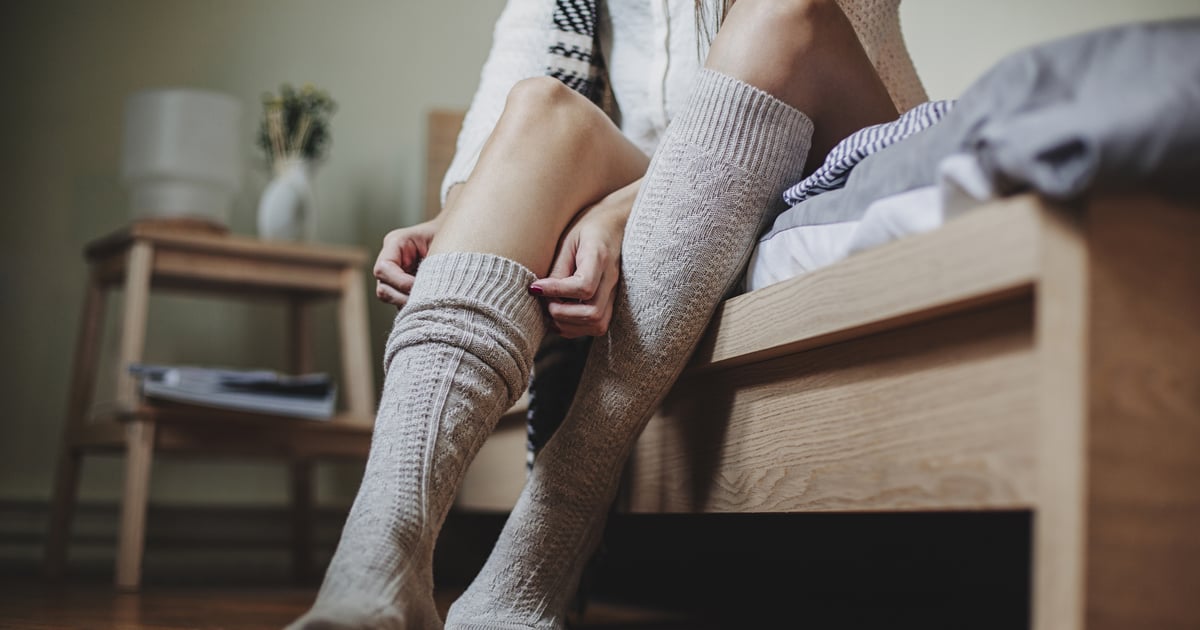
It might not be for everyone, but there’s just something about a fresh pair of fuzzy socks on a cold winter night that sends me straight to dreamland. Call it a hot take, but I know I’m not alone. Sleepy-time sock-wearers deal with plenty of online criticism, with some people arguing that wearing socks to bed is unhygienic, or even downright gross. Still, fellow sock lovers insist that sleeping with (clean) socks on is the key to the best sleep. With so much back-and-forth, we decided to put the debate to rest, defending one of the coziest sleep habits with cold, hard facts.
Admittedly, all of the nighttime-sock discourse has forced me to question if wearing socks to bed is actually beneficial, or if it just invites dirt and bacteria into the most sacred of spaces. To get to the bottom of this, we spoke to sleep experts and unpacked the sock science, digging into everything from basic hygiene to whether or not sleeping with socks on impacts the brain.
Wearing Socks to Bed: Benefits and Risks
We think of socks as a quick way to keep us warm, but sleeping with socks on is actually great for thermoregulation. “Certain parts of our skin help to release heat in the early evening so that our internal body temperature cools, which is necessary for us to feel sleepy and fall asleep,” says Mike Gradisar, PhD, head of sleep science at Sleep Cycle. “Our bodies usually release heat from our feet in the evening and the first part of the night. But for some people, they may get into bed with feet that are starting off a bit cold.” For these people, it could be useful to wear high-quality socks to bed, especially in materials like wool.
Meredith Broderick, MD, sleep neurologist and Ozlo Sleep medical advisory board member, explains that the skin on our hands and feet plays a big role in thermoregulation. “The skin in these parts of the body (soles of the feet, palms of hands, and area around the mouth) is able to dissipate heat more efficiently than skin on other parts of the body. [This] contributes to the heat loss needed for sleep, a time when core body temperature is lowered.”
Because socks help some people regulate their core body temperature, wearing socks to sleep may also reduce hot flashes during menopause, per the Cleveland Clinic. Sleeping with socks can even be helpful for disorders like Raynaud’s syndrome, which affects blood circulation, often causing colder feet. “There is also the matter of personal preference — the climate where a person lives, for instance,” Dr. Broderick says. “If they live in a colder climate and their bedroom is cold, then maybe yes, [socks are] more likely to help.”
Of course, even with these potential benefits, there’s still the question of hygiene. Thankfully, Dr. Gradisar says wearing socks to bed shouldn’t be an issue as long as you’re regularly changing your socks and washing them before rewearing. Dr. Broderick agrees that, essentially, you should be wearing clean socks to bed. “If socks are worn all around the house, especially where shoes are worn or there are pets, or the environment is dusty, this could introduce environmental or allergenic particles to the bed.”
While some people need socks in order to facilitate thermoregulation, others are doing just fine on their own, and wearing socks can cause them to overheat. Dr. Gradisar suggests that if you find yourself getting too hot in your socks, “simply take [the socks] off; stick your feet out of the covers; get comfortable; take a deep, slow breath; and drift back to sleep.” Most people will want to opt for cozy, comfortable socks, as anything too tight could negatively impact your circulation.
Does Sleeping With Socks Affect the Brain?
“Sensitive neurons in the brain are activated at sleep onset and correlate with an increase in skin temperature on the big toe, hands, and feet, then driving lowering of core body temperature,” Dr. Broderick says. While there isn’t any definitive evidence to prove that sleeping in socks affects the brain, early research indicates that warming the skin could potentially “activate these regions of the brain and facilitate sleep onset,” she says.
Can You Wear Compression Socks to Bed?
You can, but you likely don’t need to. “The only people whose sleep seems to benefit from compression socks are people diagnosed with sleep apnea and [who] typically have fluid in their legs in bed,” Dr. Gradisar says. Essentially, compression socks help prevent this fluid from traveling toward the neck and worsening sleep apnea, helping people breathe better at night. Dr. Broderick notes that compression socks, or even just elevating the legs at night, can also help blood and fluid move back to the heart for people who spend a lot of time on their feet.
The Bottom Line
Ultimately, the decision of whether or not to wear socks to bed has a lot to do with individual circumstance. If you’re unsure of which side to take, Dr. Gradisar suggests experimenting to see what works best for you. Give both techniques a chance, and keep track of your results. “Try keeping a sleep diary and wearing [socks to bed] for a few weeks, and then try without and see if you can tell a difference,” Dr. Broderick says. Whether you end up sleeping with socks or bare feet, you really can’t go wrong either way. But if you do decide to snuggle up with a pair of socks, just know that we support you. No sock-shaming here.
